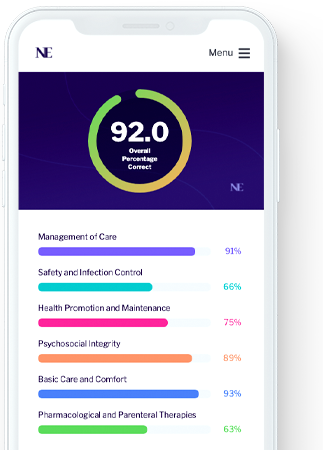Nurse Your Career Back to Life: 5 Techniques to Avoid Burnout
Whether you just graduated and are anxiously awaiting your NCLEX results, or you’re a veteran nurse with a well-honed workflow, you could be at risk of burnout. Nurses are quitting in record numbers, but why?
Apart from the expected reasons for leaving the profession like retirement, staffing shortages and overwork are driving nurses from the bedside. Even if you love what you do, your body and mind can only take so much. So, what can you do to protect yourself from burnout? Let’s talk details.
Take Breaks During Your Shift
If you have been a nurse longer than a month, you have probably worked shifts where you couldn’t find two minutes to go to the bathroom, much less eat lunch or sit and gather your thoughts. The thought of taking breaks can almost seem laughable at times. But your body and mind need them desperately.
That may sound easy, but pulling yourself away from the call lights and task list may be harder to actually do. Try to find a nurse to cover your patients for five minutes, or ask your charge nurse to keep an ear out. Here are some other options to recharge yourself throughout a shift:
- Have fast snacks on hand (like nuts or grapes).
- Take an extra 30-60 seconds in the bathroom to sit in silence and take a few deep breaths.
- Have a peaceful patient? Chart in their room with their permission.
- Offer to go on a walking errand to central supply or the pharmacy.
- Take a lunch break no matter what. Lunch is sacred.
You may be thinking of one or five more that have worked for you—use them! And tell your friends.
Be Careful with Extra Shifts
Nursing shortages are getting real, and lots of hospitals are dangling extra shifts with hefty bonuses attached. Hey, if you want to, make that bank. Just be careful with how many shifts you take on.
Some hospitals don’t allow nurses to work more than four consecutive shifts in a row, while others leave that decision to the employee. The state of Illinois put a law into effect that says nurses must have eight hours of off-time before they have to go back to work. Pennsylvania gives nurses 10 hours between shifts, so no 16-hour slogs back to back.
Your facility will tell you how many shifts in a row you may work. But your body and mental health will give you the real answer. You know yourself best, and you know what you can handle. But remember, your career is a marathon–not a sprint. Save some energy for later.
Get to Know Your Coworkers
Nothing makes a tough situation more manageable than bedside buddies. A patient yelled at you? Your nurse friend will remind you that you are awesome. You just can’t get that baby to take a bottle? Your patient care tech will show you their tricks.
No matter what you face during a shift, good coworkers have your back. Bonus points when they become friends, too! Work besties are terrific, and they will have your back even more than a coworker would. Better to face an adult diaper change or an NG tube insertion with someone who knows you, gets you, and likes you.
Having trouble making friends? A lot of facilities have mentorship programs that will pair you up with another nurse while you learn the ropes and meet people. No matter your workmate situation, you are not alone in this.
Try Mindfulness
If you feel like rolling your eyes when you hear mindfulness, hear us out. Mindfulness has gotten popular in American culture over the last several years and may feel like an overused buzzword. But here’s the thing: it works.
A study published in 2019 explained, “The American Nurses Association’s Health Risk Appraisal report found that 82% of nurses believe they’re at a significant level of risk for illness due to workplace stress.” Yikes!
This study found that nurses who attended a mindfulness class based on Kabat-Zinn’s MBSR program experienced:
- decreased stress
- increased self-compassion
- less burnout
Another option called transcendental meditation, or TM, is the practice of meditating for 20 minutes twice a day. Nurses who practice TM have also demonstrated more resilience, less burnout, and less compassion fatigue.
Pamper Yourself
Who has heard the phrase, “You only work three days a week, huh?” If you haven’t heard it yet, you probably will. Don’t let those nine-to-five friends and family make you feel guilty for your days off!
A twelve-hour nursing shift is no joke. That “12-hour” time frame does not include your lunch, commute, or time dropping off or picking up your kids. And those twelve hours are jam-packed full of difficult tasks, critical thinking, and interpersonal conflict.
You see people at their worst, and patients often take out their feelings of frustration on the closest human available: you. You don’t take it personally. You work hard. But the hours take it out of you. You have earned those days off.
When you get home, put your feet up, turn on your favorite show, and eat your favorite food. Take a shower, or snuggle with a partner. If you’re one of those supernurses, go ahead and exercise after a twelve-hour shift. You know who you are.
Whatever that looks like, take time for yourself. Your patients need you, and you can’t care for them unless you take care of yourself. You are worth it!




